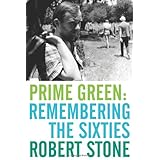
Average Reviews:

(More customer reviews)The American 1960s were a decade distinctly different from any that came before or since; changes in music, fashion, and attitudes toward government were far more pronounced than any succeeding decade. The resulting memories, and memoirs, have sometimes been consequently overdramatic. This is not the case for _Prime Green: Remembering the Sixties_ (Ecco) by Robert Stone. Stone, who is better known for three decades of novels like _A Hall of Mirrors_ or _Dog Soldiers_, certainly has some classic memories to write about. He was in Vietnam, although he was only there for a few months as a freelance journalist. He dropped acid with Richard Alpert, who emerged as guru Baba Ram Dass. He smoked grass with Ken Kesey, and though he didn't take the famous cross-country bus journey with Kesey's Merry Pranksters, it was Stone's apartment in New York that was the bus's stop at the end of the trip. He was a little older than the members of the youth movement, and there is little here about the rock music that defined the times, but he soaked up all its neo-romanticism (and its mind-altering substances) and retained some artistic detachment: "In our time we were clamorous and vain. I speak not only for myself here, but for all those with whom I shared the era and what I think of as its attitudes. We wanted it all; sometimes we confused self-destructiveness with virtue and talent, obliteration with ecstasy, heedlessness with courage." From the distance of time, Stone can depict the enthusiasms of the era without such confusions.
Stone's book starts when he was a 21-year-old sailor, a journalist third class on the USS _Arneb_, a naval transport ship. When he was a sailor, he dreamed of being a professional writer, and "amassed a small collection of magazine rejection slips." One of them was his proudest possession. It came from _The New Yorker_, and was a standard rejection, except for a handwritten note: "Try us again." He eventually worked at the _Daily News_, where he lived from paycheck to paycheck, and looked for a job "with less morally demeaning publications." He didn't find them, and in fact wound up at a paper for which he only gives a pseudonym, "an imitation of the _National Enquirer_, lacking the delicacy and taste of the original." He had grown up as a reader of Hemingway and Joyce, and his aspiration to be a novelist was fulfilled in 1968 with _A Hall of Mirrors_, which won a National Book Award. He was obviously pleased, and even more so when Paul Newman called him to propose it be made into a movie. "In spite of all the grief I ought to have seen coming," he writes, "I was well pleased at the idea of a film of my novel." There began a strange spell when he went to Hollywood, and even had an office with a secretary who would pick up the phone and say, "Mr. Robert Stone's office." This was a grand joke for Stone's stoner friends: "Usually she would be replied to with a wall of stoned giggles and a hang up." Stone writes with embarrassment about the movie (which was re-titled _WUSA_), and actually apologizes for it, and frets that it still gets shown late at night and disappoints even more viewers.
There is enormous sweetness here, especially as Stone describes his marriage, which although it started too early and was shaky, has continued. He and his wife started in New Orleans, where he was taking menial jobs. He was tempted (and nearly succumbed) to abandon her for the bizarre lure of traveling with a Christian vaudeville troupe putting on mystery plays. He was convinced that he was just too young to be tied down, away from a world of adventures. A look at his wife made all the difference: "At that moment I knew that I was not going anywhere. I loved her and _that_ was fate... there was no hope, except in this woman." Any jubilation over this decision is handled with jocular ambivalence: "This rejoicing just shows my mediocrity. Just another Dagwood bourgeois jerk." They moved around, with their children, to important literary capitals like San Francisco, London, New York, and Paris, and had adventures with Kesey, Neal Cassady, Allen Ginsberg, Jack Kerouac, and others. There will be many who read this book for new glimpses of that set, but it plays best as a memoir of a writer simply trying to make the words pay, as well as make them mean something.
Click Here to see more reviews about: Prime Green: Remembering the Sixties
Click here for more information about Prime Green: Remembering the Sixties

0 comments:
Post a Comment